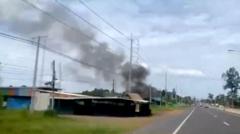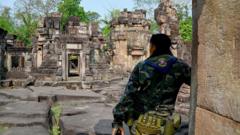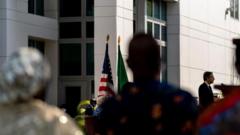The recent intensification of conflicts along the Thailand-Cambodia border has roots in long-standing political frictions, exacerbated by a leaked conversation between leaders that has ignited regional tensions and armed clashes.
Unraveling Tensions: The Deepening Crisis at the Thailand-Cambodia Border

Unraveling Tensions: The Deepening Crisis at the Thailand-Cambodia Border
Exploring the fractured relations between Thailand and Cambodia amid escalating military confrontations and personal political betrayals.
In recent weeks, the border between Thailand and Cambodia has witnessed escalating military confrontations that have resulted in tragic casualties. Both nations share a contentious and densely forested border, fraught with disputes over territorial claims. Clashes have occurred previously, notably in 2008 and 2011, leaving dozens dead, but recent developments appear to have sparked a more violent escalation.
This latest conflict broke out on July 24, triggered by an explosion from a landmine that injured five Thai soldiers. While Thai authorities reported the deaths of 12 people, mostly civilians, Cambodia has not confirmed its losses. Tensions between the two nations have been exacerbated by deteriorating political relations spurred by a leaked phone conversation between Cambodian leader Hun Sen and Thailand’s former Prime Minister Paetongtarn Shinawatra, which has left diplomatic relations in tatters.
The leaked conversation, which revealed Paetongtarn's criticism of one of her military commanders, embarrassed her and ignited public outrage, culminating in her suspension as prime minister. While it is unclear why Hun Sen leaked the conversation—potentially damaging a decades-old relationship between their families—some speculate it may have been a strategic maneuver amidst rising tensions. This betrayal has fueled an increasingly vitriolic exchange between the two nations.
Compounding the diplomatic crisis, border trade has come to a standstill, with Thai police launching investigations into Cambodian business figures tied to organized crime. Both sides are on high alert, with dangerous potential for further military engagements. Rather than opting for de-escalation, Hun Sen has escalated rhetoric against Thailand, claiming he possesses damaging evidence against Thaksin Shinawatra that could deepen the quarrel.
Simultaneously, domestic challenges plague both nations. Cambodia’s economy remains shaky, with slow tourism recovery post-pandemic, while Thailand grapples with economic stagnation and potential US tariffs. Strong leadership seems absent from either side, as Hun Manet, the inexperienced Cambodian leader, lacks a solidified authority and Thaksin’s party struggles to maintain a robust government.
Despite the evident tensions, there remains the potential for resolution, should experienced leaders like Hun Sen and Thaksin choose to engage in dialogue. The role of ASEAN may also prove crucial as it aims to prevent violence among member nations. However, the motivations behind Hun Sen’s recent actions remain ambiguous: whether acting against Thailand's crackdown on illegal gambling or simply seizing a political advantage.
As the situation develops, the international community watches closely, hoping for a diplomatic resolution to a conflict that has deep historical roots and significant implications for the stability of Southeast Asia.




















